Gearing up for another NaNoWriMo, I purchased a very short book on writing the cozy mystery. I used kind of a how-to book for my 15 flash fictions in 31 days project in July and it went really, really well, so I’m looking for similar guidance for NaNoWriMo.
I’m thinking of revisiting a failed concept for a few NaNos ago, a cozy mystery set in an elementary school with a tweener as the sleuth. It gives me something of a new concept in a new (to me) genre, and it has the bonus of being a good audience for a complete novel at 50,000 words.
I’m wolfing down a quarter-pounder with cheese (deluxe) meal at the McD’s on the corner, coming down off the post-concert high from New Order. It was a most excellent show, and Kathy and I had a great time from rather good seats.
I just saw a Domino’s delivery car go through the McD’s drive-through.
I’m 59% of the way through The Bookshop, the Penelope Fitzgerald novel from which the film is adapted. It’s rather good. Such a completely different voice and style from Kevin Kwan’s in Crazy Rich Asians and China Rich Girlfriend, both of which I enjoyed.
I want to be a writer whose fans enjoy his voice. I enjoy my voice, although I have to admit I’m getting tired of it, and I’ve been playing around with some variations to see if they fit.
In John Steinbeck’s Sweet Thursday, the sequel to Cannery Row, the author refers to himself in the prologue, describing a conversation between him and one of the characters. I might be remembering some of this incorrectly, but the gist is that the writer agrees to keep his flowery prose limited to a few chapters, and agrees further to title the chapters “Hooptedoodle” so the reader who avoids flowery prose can just skip ahead.
When Steinbeck wants to be showy, he can really be showy. It’s some lovely writing. But it’s all Steinbeck’s voice, the regular chapters, the intercalary chapters, and the hooptedoodle chapters. I want to be this consistent.
No problem, right? I mean Steinbeck did it.
Sweet Thursday is not one of his stronger novels, but it’s one of my favorite. I think it’s my third favorite behind The Grapes of Wrath and Of Mice and Men. For some reason I like it better than Cannery Row, ‘though it’s not nearly as good.
Friday 5 from here.
- What should be the collective name for accountants?
A reconciliation of accountants. - What should be the collective name for cafe baristas?
How about a misspelling of baristas? - What should be the collective name for tattoo artists?
Two other respondents suggested a sleeve of tattoo artists, which I totally love, but since I refuse to copy, how about a permanence of tattoo artists? - What should be the collective name for people who vape?
A cumulonimbus of vapers. - What should be the collective name for people in your profession or hobby?
A futility of writers. A paragraph of writers. An epitaph of writers. Ooh yeah, let’s go with that one.

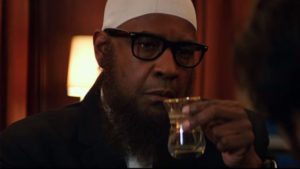 I never saw 2014’s The Equalizer, so The Equalizer 2 is completely fresh snow for me, and it’s not bad if you don’t mind your snow a little on the vindictive side.
I never saw 2014’s The Equalizer, so The Equalizer 2 is completely fresh snow for me, and it’s not bad if you don’t mind your snow a little on the vindictive side.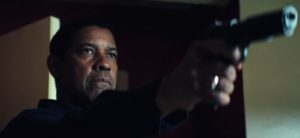 Someone close to McCall is murdered, and there (apparently) aren’t very many people close to McCall, so he goes after the people responsible, only he doesn’t know who these people are. At first.
Someone close to McCall is murdered, and there (apparently) aren’t very many people close to McCall, so he goes after the people responsible, only he doesn’t know who these people are. At first. Alas, the film is directed by Antoine Fuqua, and I haven’t seen all of his movies with Denzel, but I’ve seen Training Day, a film I disliked because Denzel hams it up like an Easter brunch. Thankfully, there are only a couple of offending scenes like this here, but there was a moment where I was half-certain McCall was about to proclaim at the top of his lungs that King Kong ain’t got s*** on him. I tolerated these couple of scenes because I like the rest of this film just fine.
Alas, the film is directed by Antoine Fuqua, and I haven’t seen all of his movies with Denzel, but I’ve seen Training Day, a film I disliked because Denzel hams it up like an Easter brunch. Thankfully, there are only a couple of offending scenes like this here, but there was a moment where I was half-certain McCall was about to proclaim at the top of his lungs that King Kong ain’t got s*** on him. I tolerated these couple of scenes because I like the rest of this film just fine.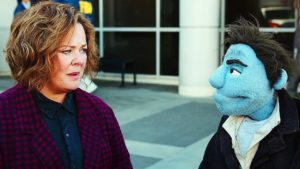 Picture a world like the one in Who Framed Roger Rabbit? but instead of humans and toons, the world is cohabited by humans and puppets with serious discrimination against puppets. This is the world in which The Happytime Murders is set, only instead of some made-up town, we are right in Los Angeles with all its glamour and sleaze.
Picture a world like the one in Who Framed Roger Rabbit? but instead of humans and toons, the world is cohabited by humans and puppets with serious discrimination against puppets. This is the world in which The Happytime Murders is set, only instead of some made-up town, we are right in Los Angeles with all its glamour and sleaze.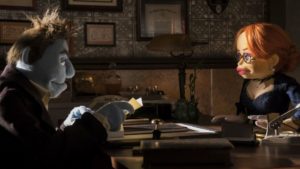
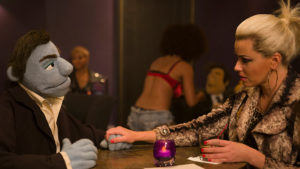
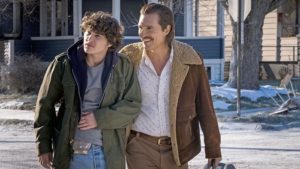 It’s difficult to know how to feel about what happens to Rick Wershe, Jr. at the end of White Boy Rick, and this makes it difficult to decide how I feel about the movie. Do we care more about justice in the eyes of the law, or justice according to a sense of right and wrong, and how do Rick’s choices stand up to either standard? If the film wants us to take a side, I can’t tell which it is.
It’s difficult to know how to feel about what happens to Rick Wershe, Jr. at the end of White Boy Rick, and this makes it difficult to decide how I feel about the movie. Do we care more about justice in the eyes of the law, or justice according to a sense of right and wrong, and how do Rick’s choices stand up to either standard? If the film wants us to take a side, I can’t tell which it is.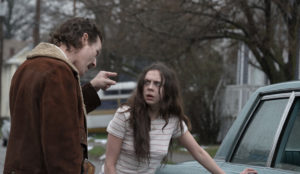 This makes me dissatisfied with the film, which is a disappointment because I like and care about this character, and Richie Merritt as White Boy Rick does a nice job playing him. Guided by a sense that life is ripping him off but feeling empowered to do something about it, Rick is suspicious of his father’s optimistic outlook and unsure what to do about a junkie older sister whom he cares very deeply about.
This makes me dissatisfied with the film, which is a disappointment because I like and care about this character, and Richie Merritt as White Boy Rick does a nice job playing him. Guided by a sense that life is ripping him off but feeling empowered to do something about it, Rick is suspicious of his father’s optimistic outlook and unsure what to do about a junkie older sister whom he cares very deeply about.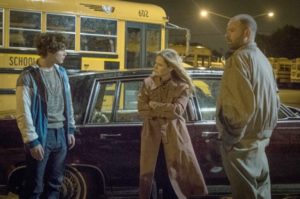 It’s fairly easy to read Rick Sr.’s moral code, but Rick Jr.’s is still being formed. Which of his bad decisions are mere errors in judgment and which are dictated by a slightly skew sense of right and wrong? I’m okay with a movie whose position differs from mine on this, but the movie doesn’t seem to take a position, taking some of the power out of some very good performances.
It’s fairly easy to read Rick Sr.’s moral code, but Rick Jr.’s is still being formed. Which of his bad decisions are mere errors in judgment and which are dictated by a slightly skew sense of right and wrong? I’m okay with a movie whose position differs from mine on this, but the movie doesn’t seem to take a position, taking some of the power out of some very good performances.